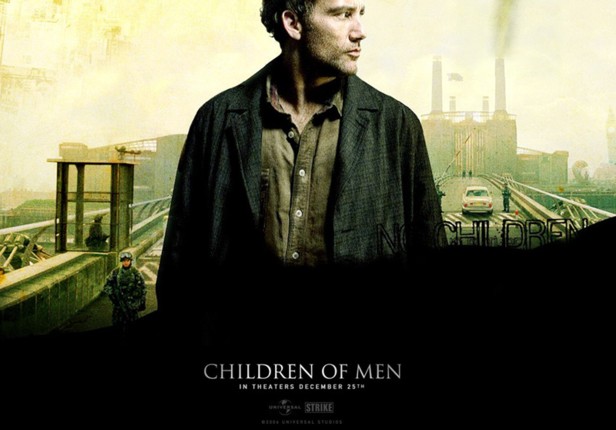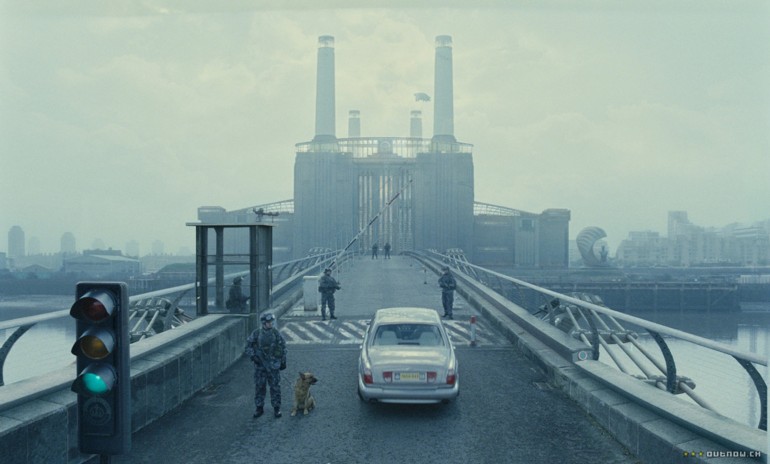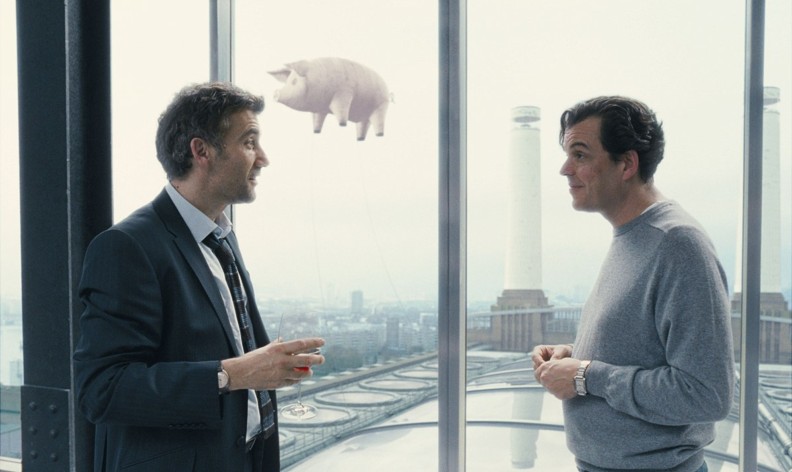 This is an astounding piece of work – easily one of the best films of 2006. Although set in the future, it incorporates images and plot elements that resonate with the contemporary world, touching on themes related to illegal immigration, terrorism, the war in Iraq, etc. The effect is unnerving and powerful, using the future as a mirror to the present in order to deal with dark and troubling truths that most contemporary films avoid. In its portrait of a future England under a fascist government, the film is in some ways slightly similar to the interesting V FOR VENDETTA, which dealt with similar themes, but CHILDREN OF MEN is even more successful in terms of dramatizing its political ideas, avoiding comic book violence in favor of a grittier, more believable hard-boiled tone, with echoes of film noir.
This is an astounding piece of work – easily one of the best films of 2006. Although set in the future, it incorporates images and plot elements that resonate with the contemporary world, touching on themes related to illegal immigration, terrorism, the war in Iraq, etc. The effect is unnerving and powerful, using the future as a mirror to the present in order to deal with dark and troubling truths that most contemporary films avoid. In its portrait of a future England under a fascist government, the film is in some ways slightly similar to the interesting V FOR VENDETTA, which dealt with similar themes, but CHILDREN OF MEN is even more successful in terms of dramatizing its political ideas, avoiding comic book violence in favor of a grittier, more believable hard-boiled tone, with echoes of film noir.
The film is set in 2027, at a time when no human babies have been born for eighteen years. With humanity inevitably dying out, the world has surrendered to despair, and despair has led to chaos around the world. A newscast tells us, somewhat condescendingly, “Only Britain soldiers on.” The price of maintaining this stiff upper lip in the face of adversity seems to be a militaristic government that has declared all immigrants to be illegal and is systematically rounding them up for removal to refugee camps. The story follows Theo (Clive Owen), a burned out cynic in the classic Humphrey Bogart mode (think of CASABLANCA). Since a personal tragedy years ago, he is sleepwalking through life, believing in nothing, caring about nothing. Inevitably, he is dragged out of his stupor – in this case by his ex-wife Julian (Julianne Moore), who is part of a terrorist organization called the “Fishes” that is fighting for equal rights for immigrants to smuggle a pregnant woman out of the country, so that she can join up with the Human Project, an organization trying to find a solution for the infertility problem. Complications arise when Julian’s comrades decide they want the black woman’s child for political purposes – a figurative “banner” under which they will foment a revolution. Theo and the mother must make their own way, avoiding both the terrorists and government forces (working on the assumption that the racist government would not want to acknowledge that the future of the human race depends on a black woman).
In effect, despite the science-fiction setting, this is an escape movie, and it plays out like a tense action-thriller. There are numerous nail-biting suspense sequences, many of them featuring explosive, edge-of-your-seat action, often captured in long, unedited camera takes that create a convincing sense of realism far removed from the typical Hollywood thriller formula. This is not a Schwarzenegger-saves-the-day movie; if one had to make a comparison, it might be closer to THE FRENCH CONNECTION.
The underlying intent, however, is not to simply thrill. Beneath the sound and fury of its aggressive – and stunning – action sequences, charts the rekindling of optimism in the world, as personified by Theo. What’s at stake is nothing less than the survival of the human race, both physically and spiritually; with physical extinction no longer an inevitability, we see the soul of the world stirring again in Theo’s eyes. Unfortunately, the physical survival of individuals is a small thing in comparison to that of the entire human race, and great sacrifices are required to ensure the safety of the mother and her child.
The formulation may sound depressing, especially in the context of the film’s dreary, dystopian future, but in truth CHILDREN OF MEN is amazingly uplifting. The film is actually profound in its simplicity. The theme underlying the story is nothing less than Hope: what happens to us when we lose it, and how far individual people will go – and at what cost to themselves – to regain it? Within the context of a piece of speculative fiction, CHILDREN OF MEN offers answers that are as dramatic and moving – in fact, more so – than you will see in a dozen typical Oscar-bait movies.
The script (by multiple screenwriters, working from a novel by P.D. James) does an excellent job of infusing its message into the story, instead of stating it outright. Owen is excellent in the lead; it’s hard to tell if he’s really a gifted actor or simply someone with great movie star charisma whose good looks also suggest some kind of hidden depths beneath the surface; in either case, he works perfectly in the role of Theo. The rest of the cast is great too, particularly Michael Caine as Theo’s friend, an aging pot-smoking radical who seems to have wandered in from a ’60s film, and Chiwetel Ejiofor, who is properly fanatical as a terrorist while also providing an occasional glimmer of a soul.
Technical credits are superb, with a moving mixture of soundtrack music that includes everything from Deep Purple’s “Hush” to King Crimson’s stunning epic “In the Court of the Crimson King.” Orchestrating all of the elements, director Alfonso Cuaron turns in a film that is big and bold, with a vivid and convincing vision of the future that never overwhelms the human core of the story. This is the sort of film that sets the standard, becoming the yard stick by which subsequent efforts must be judged and – more often than not – found wanting.
BEHIND THE SCENES
Among its many other virtues, CHILDREN OF MEN features a handful of brilliant set pieces (a childbirth, a motorcycle attack on a moving car) that are achieved in long single takes, without editing to hide any mistakes.
By far the most impressive of these is an amazingly long sequence in which the film’s hero (Clive Owen) navigates his way through a battle between insurgents and government forces while he tries to make his way into a building and rescue a woman and her newborn child – the first baby born in the world in eighteen years.
The timing of the sequence is astounding. It compresses into a single shot as much action as is contained in many entire films, and as impressive as the individual stunts and pyrotechnics are, the thing that truly blows you away is the fact that you’re seeing it all happen in real time, unedited.
National Public Radio has an audio interview with director Alfonso Cuaron, in which he explains how the shot was achieved. The sequence was prepped for twelve days, then shot over the course of two days, but only one complete take was captured on film – and that was nearly ruined when the director yelled “Cut!”
Cuaron explained that he choreographed the action to the inch, but once the camera was running he had to depend on his cameraman and his actor to make the scene work – especially Owen, who had to react believably when things (inevitably) went off cue.
After some aborted takes, time was running out on the location. During the final take (the one included in the film) blood was accidentally spit into the lens, prompting Cuaron to call “Cut.” Fortunately, an explosion covered his voice, and the cameraman continued filming; otherwise, the shot would have had to be abandoned. After the shot was complete, Cuaron mentioned the accidental blood spatter to his crew, who told him it was actually a miracle – an unplanned bit of action that actually improved the shot.
TRIVIA
In one early scene, Theo (Clive Owen) visits his friend Nigel (Danny Huston), whose hobby appears to be rescuing famous works of art from around the globe (no doubt a tricky business at a time when most of the world has descended into chaos). As Theo and Nigel stand in front of a window in Nigel’s office, we see what is presumably one of those art works outside: a giant inflatable pig tethered to the towers of a factory. The giant balloon’s presence is never acknowledged or explained, but fans of Pink Floyd will recognize it from the album cover art for the rock band’s album Animals.
DVD DETAILS
In March 2007, Universal Pictures released CHILDREN OF MEN on disc in three forms: a Widescreen DVD Full Screen DVD
(ASIN: B000N6TX1I), a Full Screen DVD
(ASIN: B000N6TX1S), and a DVD/HD-DVD Combo
(ASIN: B000N6TX22 – one side offers High-Def DVD; the other is a standard DVD that plays on ordinary machines).
The Widescreen DVD presents the film in a nice 1.85 letterboxed transfer, with English, Spanish, and French 5.1 Dolby Digital stereo (the dubbing seems high-quality, in terms of sound recording and the matching of lip movements). The running time is divided into 20 easily accessible chapter stops, including one named after the wonderful King Crimson song “In the Court of the Crimson King,” which plays under Theo’s visit to the Arc of the Arts.
DELETED SCENES offers three short snippets; without individual access of chapter titles, the run continuously.
- Theo gives cigarette to a street person while some low-tech dental surgery goes on in the background.
- Theo’s landlord bugs him about being four months behind on his rent, indicating that he does indeed need the money that Julian’s group offers him to help get transit papers.
- Theo and his cousin Nigel walk down a corridor in the Arc of the Art, discussing the self-portraits hanging on the walls. Although the scene was deleted, one line made it into the film, in slightly altered form. Here, Nigel says “That thing in New York was a real blow to us,” indicating some kind of violent holocaust that wiped out most of the arts, prompting Theo to reply, “Not to mention the people.” In the film, the exchange is overlaid as voiceovers during the lunch scene, except that “New York” is changed to “Madrid” to connect more smoothly with the rest of the conversation. Of the three deleted scenes, this is the only one that offers much of interest.
BONUS FEATURES: The remaining bonus features consist of behind-the-scenes featurettes, a short documentary, and analysis of the film.
- “The Possibility of Hope” is a documentary by CHILDREN OF MEN’s director, Alfonso Cuaron, which illustrates some of the underlying concerns in the film’s subtext. Seldom referencing the feature film directly, the documentary instead intercuts footage with philosophers expressing concern for the future, which is threatened by over-population and global warming, which could create conditions similar to those seen in CHILDREN OF MEN
- “Children of Men Comments by Slavoj Zizek” offers thoughtful insights by the philosopher, who argues that the film’s environment is its real story; that CHILDREN OF MEN is less about an apathetic hero who re-engages the world than it is about the world itself, with the hero as a prism through which we see that world obliquely. To illustrate his point, there are several shots from the movie that display the director’s technique of panning off Theo to pause and look at the world around him.
- “Under Attack” examines Cuaron’s penchant for filming the major action sequences in single (apparently) uninterrupted takes. Cuaron explains the effect he wanted was to replicate the feel of someone with a home DV camera running after the characters and capturing everything that happened. Two scenes are examined in detail: the attack on the car, when Julian is killed, and the opening explosion in the coffee shop. Behind-the-scenes footage shows the car scene being achieved with rig mounted atop the car, which allowed director, camera operator, and other crew monitor the scene from above while the camera inside the car was moved by remote control. The featurette makes no mention of the digital post-production work that must have been necessary to put the missing roof back on the car and (most likely) to combine multiple takes into a seemingly continuous shot. Also, the film’s most ambitious extended take action-scene, the length chase through the battle near the end, is conspicuous by its absence, suggesting that there must be plans for a later “special edition” DVD that will include what is missing here.
- “Theo & Julian” offers Alfonso Cuaron an opportunity to praise Julianne Moore and Clive Owen,” whom he calls “my co-writers” on the film. Much is made of the portrayal of Theo as the atypical movie hero, a clumsy “veteran of hopelessness” who is “like a zombie,” according to Cuaron, while Julian is the catalyst for his reawakening.
- “Futuristic Design” tells us that Cuaron wanted his film to be the “anti-BLADE RUNNER” – that is, the concept was not to go for a spectacular vision of the future but for something more run-down. Cuaron specifically directed his design crew to avoid “great” ideas in favor of real life references: saying that he “tried not to see the future but to recognize the present.” This featurette mentions the copy of Michaelangelo’s David, seen briefly in the Arc of the Arts, but does not bother to explain the rational behind including Pink Floyd inflatable pig in the same sequence.
- “Visual FX: Creating the Baby” is a visual illustration of the step-by-step process used to create the birth scene, beginning with two live-action takes that were seamlessly joined together into an apparently continuous shot, which allowed the character of Kee (Claire-Hope Ashitey) to walk into a room, go off-screen for a few seconds, and next be seen in a prosthetic rig that simulated giving birth. With almost no behind-the-scenes footage, this featurette simply shows the footage first as it was originally shot, then with the various layers of digital effects superimposed to replace the inanimate prosthetic baby with a computer-generated one that kicked and cried. The only explanations come in the forms of subtitles pointing out the additions and identifying the processes. Although terms like “sub-surface scatter” and “ambient occlusion” are never defined, the featurette nonetheless does a great job of revealing how this marvelous sequence was achieved. It is also the only point on the DVD where there is any acknowledgement that some “continuous uninterrupted shots” were actually multiple takes spliced together digitally – a process that was probably used in some of the other scenes as well.
Overall, the initial DVD release of CHILDREN OF MEN offers a good presentation of the film and some interesting extras. Especially appreciated is the attempt to offer some analysis and some background for the philosophical foundation on which the film’s vision of the future rests. Nevertheless, it is easy to imagine a more exhaustive DVD package that would offer more in-depth coverage of the film’s making, especially the virtuoso street-fight battle sequence near the conclusion. A film as rich as CHILDREN OF MEN raises many questions: no doubt, leaving many unanswered creates a certain mystique and allows viewers to supply their own answers; nevertheless, it would be nice to pin Cuaron down on a few more details (like the balloon pig).
CHILDREN OF MEN (2006). Directed by Alfonso Cuaron. Screenplay by Cuaron & Timothy J. Sexton and David Arata and Mark Fergus & Hawk Ostby, from the novel by P.D. James. Cast: Clive Owen, Julianne Moore, Chiwetel Ejiofor, Charlie Hunnam, Danny Huston, Claire-Hope Ashitey, Peter Mullan, Pam Ferris, Michael Caine.

